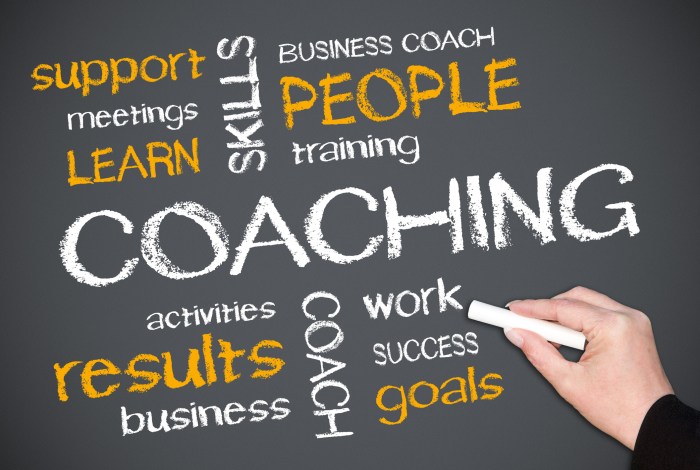
Navigating the complexities of the business world can be daunting, but the right guidance can transform challenges into opportunities. Business coaching programs offer a structured path to professional development, providing tailored support and strategies for achieving ambitious goals. Whether you’re a seasoned executive or a budding entrepreneur, these programs offer a wealth of knowledge and expertise to help you navigate the intricacies of business growth and success.
This guide explores the various types of programs available, the costs involved, and the crucial steps in selecting a suitable coach, ultimately empowering you to make informed decisions that align with your unique business needs.
From understanding different coaching styles and target audiences to evaluating the return on investment and navigating ethical considerations, we delve into the multifaceted world of business coaching. We’ll also examine the synergistic relationship between coaching and various aspects of business development, from strategic planning to operational efficiency. By the end, you’ll have a clear understanding of how to leverage business coaching to propel your business to new heights.
Types of Business Coaching Programs
Business coaching programs are diverse, catering to a wide range of industries, business sizes, and individual needs. Understanding the different types available is crucial for selecting the right program to achieve specific goals. The choice depends on factors like experience level, business type, and desired outcomes.
Categorization of Business Coaching Programs
Business coaching programs can be categorized based on several factors, including industry focus, target audience, and coaching style. This allows individuals and businesses to find a program that precisely addresses their requirements.
| Program Type | Target Audience | Coaching Style | Key Benefits |
|---|---|---|---|
| Sales Coaching | Sales teams, entrepreneurs, sales managers | Action-oriented, results-focused, often incorporating sales methodologies like SPIN selling or Sandler selling | Increased sales revenue, improved sales processes, enhanced team performance, better sales pipeline management |
| Leadership Coaching | Executives, managers, team leaders | Transformational, focusing on developing leadership skills, emotional intelligence, and strategic thinking | Improved leadership skills, enhanced team motivation, increased employee engagement, better decision-making |
| Executive Coaching | C-suite executives, senior managers | Highly personalized, strategic, focusing on long-term vision and organizational effectiveness | Improved strategic planning, enhanced leadership capabilities, increased organizational performance, better succession planning |
| Startup Coaching | Entrepreneurs, founders of new businesses | Mentorship-driven, practical, often focusing on lean startup principles and rapid growth strategies | Faster business growth, improved business model, secured funding, effective market entry |
| Marketing Coaching | Marketing professionals, entrepreneurs | Data-driven, focused on digital marketing strategies, brand building, and customer acquisition | Improved brand awareness, increased lead generation, higher conversion rates, effective marketing ROI |
| Financial Coaching for Businesses | Business owners, financial managers | Practical, focused on financial planning, budgeting, and financial analysis | Improved financial management, better cash flow, reduced expenses, increased profitability |
Group Coaching versus One-on-One Coaching
The choice between group and one-on-one coaching significantly impacts the experience and outcomes. Group coaching offers a cost-effective solution with peer learning and shared experiences, while one-on-one coaching provides highly personalized attention and tailored strategies.
Group Coaching: Benefits include networking opportunities, shared learning experiences, and a lower cost per participant. Drawbacks might include less personalized attention and potentially slower progress due to varied individual needs.
One-on-One Coaching: Benefits include highly personalized attention, tailored strategies, and faster progress due to dedicated support. Drawbacks might include higher cost and a lack of peer interaction and diverse perspectives.
Curriculum and Structure of a Comprehensive Business Coaching Program
A comprehensive business coaching program typically follows a structured curriculum, often including assessments, goal setting, action planning, regular check-ins, and ongoing support. The specific content varies depending on the program’s focus, but common elements include:
Many programs incorporate self-assessment tools to identify strengths and weaknesses. This is followed by the development of personalized goals and action plans. Regular coaching sessions provide accountability, feedback, and guidance in implementing the plans. Ongoing support often includes access to resources, materials, and a community of peers.
Cost and Investment in Business Coaching Programs

Investing in a business coaching program is a significant decision, requiring careful consideration of various factors. The cost, while a primary concern, shouldn’t overshadow the potential return on investment (ROI). Understanding the pricing structures and hidden costs allows for a more informed and strategic investment.
Factors Influencing the Cost of Business Coaching Programs
Several key factors determine the cost of business coaching programs. The experience and reputation of the coach significantly impact pricing. Highly sought-after coaches with proven track records naturally command higher fees. Program length also plays a crucial role; longer, more comprehensive programs typically cost more than shorter, more focused engagements. The intensity of the program, measured by the frequency and duration of coaching sessions, also contributes to the overall cost.
A program with weekly, hour-long sessions will be more expensive than one with monthly half-hour sessions. Finally, the specific services included, such as workshops, materials, or access to online resources, add to the final price. For example, a coach specializing in niche industries might charge a premium reflecting their specialized knowledge.
Pricing Models for Business Coaching Programs
Business coaches utilize various pricing models to suit different client needs and budgets. Hourly rates are common, providing flexibility for clients requiring a specific number of sessions. Package deals offer a set number of sessions at a discounted rate compared to hourly billing, often providing better value for clients committing to a longer-term engagement. Retainer fees provide ongoing support over a set period, usually involving a monthly payment for a pre-determined number of sessions and other services.
This model is particularly attractive to businesses requiring consistent coaching and support. Some coaches also offer tiered pricing, allowing clients to choose a package that aligns with their budget and needs. For instance, a basic package might include monthly check-ins, while a premium package could incorporate additional workshops and strategic planning sessions.
Return on Investment (ROI) from Business Coaching
The ROI from business coaching is not always immediately quantifiable, but it can be substantial over time. Improved business performance, increased profitability, enhanced leadership skills, and more efficient processes are just some of the potential benefits. For example, a business owner who invests in coaching to improve their sales strategies might see a significant increase in revenue within six months, easily offsetting the initial investment.
Similarly, a manager who undergoes leadership coaching could improve team performance, leading to higher productivity and reduced employee turnover. While calculating a precise ROI requires careful tracking of key performance indicators (KPIs) before, during, and after the coaching engagement, the potential for significant gains is often substantial. Many successful businesses cite business coaching as a critical factor in their growth and success.
Potential Hidden Costs Associated with Business Coaching Programs
It’s crucial to consider potential hidden costs beyond the stated program fee.
- Travel expenses: If sessions are in-person, factor in travel costs, accommodation, and potential loss of work time.
- Materials and resources: Some programs require the purchase of additional books, software, or online tools.
- Opportunity cost: Time spent in coaching sessions represents time away from other business activities. This opportunity cost should be factored into the overall investment.
- Implementation costs: Implementing the strategies and recommendations from the coach might require additional resources or personnel.
Finding and Selecting a Business Coach

Choosing the right business coach is crucial for achieving your goals. A poorly matched coach can lead to wasted time and resources, while the right one can be a catalyst for significant growth. This section will guide you through the process of identifying and selecting a coach who aligns perfectly with your needs and aspirations.Finding a qualified and reputable business coach requires a strategic approach.
Don’t rely solely on online directories; leverage your network and seek recommendations from trusted colleagues, mentors, or industry peers. Look for coaches with demonstrable experience in your specific industry or niche, and examine their credentials and testimonials carefully. Professional certifications, such as those offered by the International Coaching Federation (ICF), can indicate a commitment to ethical practices and ongoing professional development.
Thoroughly researching a coach’s background, including their client success stories and coaching methodology, is essential.
Matching Coaching Styles and Philosophies with Business Needs
Aligning your coaching style and philosophy with your business needs is paramount for a successful coaching relationship. Different coaches employ various methodologies, from a highly structured, results-oriented approach to a more collaborative, holistic style. Consider your personality, learning style, and the specific challenges your business faces. For example, a fast-growing startup might benefit from a coach with expertise in scaling operations and managing rapid growth, while an established company seeking to improve internal communication might prefer a coach focused on team dynamics and leadership development.
A mismatch in coaching styles can lead to frustration and a lack of progress. Therefore, careful consideration of your business needs and the coach’s approach is crucial for achieving optimal results.
Checklist of Questions to Ask Potential Business Coaches
Before committing to a coaching program, it’s vital to thoroughly vet potential coaches. Asking the right questions will help you determine if they possess the expertise, experience, and personality to guide you effectively. This checklist provides a structured approach to evaluating prospective coaches.
- What is your experience coaching businesses similar to mine?
- Can you provide specific examples of your past successes with clients facing similar challenges?
- What is your coaching methodology, and how does it align with my learning style and business goals?
- What is your approach to accountability and progress tracking?
- What are your fees and payment terms?
- What is your cancellation policy?
- What is your client success rate, and how do you measure it?
- Can I speak with a current or former client as a reference?
- What are your qualifications and certifications?
- What is your availability and how will our sessions be structured?
Business Coaching and Business Development
Business coaching plays a pivotal role in accelerating business development. By providing strategic guidance and personalized support, coaches empower business owners and leaders to overcome challenges, seize opportunities, and achieve sustainable growth. This synergistic relationship allows businesses to move beyond reactive problem-solving and adopt a proactive, results-oriented approach to development.Business coaching significantly enhances various aspects of business development strategies.
It acts as a catalyst, driving improvements across different functional areas and fostering a culture of continuous improvement and innovation.
Business Coaching’s Impact on Business Planning
Effective business planning is the cornerstone of any successful business. A business coach helps refine the planning process by providing a structured framework, facilitating strategic thinking, and ensuring alignment between the business’s vision, goals, and operational strategies. This includes assisting with market analysis, competitive assessments, financial forecasting, and risk management. For instance, a coach might guide a small bakery owner in developing a detailed five-year plan, incorporating market research data to predict future demand and adjust production capacity accordingly.
They could also help identify potential risks, such as changes in ingredient costs, and develop mitigation strategies.
Business Coaching’s Influence on Marketing and Sales
Coaching can significantly improve a company’s marketing and sales performance. Coaches work with business leaders to develop targeted marketing campaigns, optimize sales processes, and enhance customer relationship management. For example, a coach might help a tech startup refine its messaging to better resonate with its target audience, leading to increased brand awareness and lead generation. In sales, coaching can improve sales team performance through training, skill development, and sales strategy refinement.
A coach might help a sales team adopt a more consultative selling approach, focusing on understanding customer needs and building long-term relationships.
Business Coaching’s Contribution to Operational Efficiency
Business coaching also improves operational efficiency. Coaches help identify bottlenecks, streamline processes, and optimize resource allocation. This might involve implementing new technologies, improving team communication, or refining workflow management. Consider a manufacturing company struggling with production delays. A business coach could analyze their processes, identify inefficiencies, and recommend solutions such as implementing lean manufacturing principles or investing in automation technology.
The outcome is improved productivity, reduced costs, and increased profitability.
The Business Coach’s Role in Fostering Innovation and Growth
A business coach acts as a catalyst for innovation and growth. They challenge the status quo, encourage creative thinking, and help businesses adapt to changing market conditions. This might involve facilitating brainstorming sessions, introducing new ideas, or helping businesses explore new market opportunities. For example, a coach might encourage a traditional bookstore to explore online sales channels or develop a loyalty program to enhance customer retention.
They also help cultivate a culture of continuous learning and improvement within the company, fostering a more dynamic and adaptable organization.
Synergy Between Business Coaching and Business Development
Imagine a Venn diagram. One circle represents “Business Coaching,” encompassing elements like strategic guidance, skill development, accountability, and mentorship. The other circle represents “Business Development,” including areas like market analysis, strategic planning, sales growth, and operational efficiency. The overlapping area, the largest portion of the diagram, showcases the powerful synergy between the two. This overlapping section vividly illustrates the interconnectedness and mutual reinforcement of business coaching and business development.
Within this overlapping area, key aspects like improved decision-making, enhanced performance, increased profitability, and sustainable growth are prominently displayed. The diagram visually represents how business coaching directly supports and amplifies the effectiveness of business development initiatives, leading to more significant and lasting results.
Ethical Considerations in Business Coaching
Ethical considerations are paramount in business coaching, forming the bedrock of a trusting and productive relationship between coach and client. A strong ethical foundation ensures the integrity of the coaching process and fosters positive outcomes for the client’s business. Ignoring ethical principles can severely damage a coach’s reputation and irreparably harm the client’s business.
Responsibilities of a Business Coach
Business coaches bear significant ethical responsibilities. These responsibilities encompass maintaining client confidentiality, avoiding conflicts of interest, and establishing and upholding clear professional boundaries. Breaches in these areas can lead to legal repercussions, reputational damage, and a breakdown of trust, ultimately hindering the coaching process and harming the client’s business. For instance, disclosing confidential client information without consent could lead to legal action and severely damage the coach-client relationship.
Similarly, a conflict of interest, such as the coach simultaneously working with a competitor of the client, undermines the coach’s impartiality and erodes the client’s trust. Establishing clear professional boundaries, including defining the scope of the coaching relationship and setting appropriate communication protocols, is crucial for maintaining a healthy and productive working relationship.
Reinforcing Ethical Business Practices Through Coaching
Business coaching can actively reinforce ethical business practices. By providing a safe space for self-reflection and discussion, coaches help clients identify and address potential ethical dilemmas within their businesses. The coaching process can encourage clients to develop and implement robust ethical codes of conduct, promoting transparency and accountability within their organizations. For example, a coach might guide a client through the development of a comprehensive policy addressing conflicts of interest, ensuring the client’s organization operates with integrity and avoids potential ethical pitfalls.
This proactive approach not only mitigates risk but also strengthens the client’s brand reputation and fosters a positive work environment.
Impact of Unethical Behavior by a Business Coach
Unethical behavior by a business coach can have devastating consequences for a client’s business. A coach who breaches confidentiality, engages in conflicts of interest, or manipulates a client for personal gain can severely damage the client’s trust and jeopardize the success of the business. This can manifest in various ways, including lost opportunities, damaged reputation, legal challenges, and financial losses.
For example, a coach who misrepresents their qualifications or guarantees unrealistic results can lead a client to make poor business decisions, resulting in financial setbacks and reputational harm. The client’s trust in the coaching process, and potentially in all business advisors, is also eroded, impacting their future decision-making.
Code of Conduct for Business Coaches
A strong code of conduct is essential for maintaining the highest ethical standards in business coaching. Such a code should clearly Artikel the responsibilities and expectations of business coaches.
- Maintain strict confidentiality regarding all client information.
- Avoid any conflicts of interest that could compromise impartiality.
- Establish and maintain clear professional boundaries with clients.
- Provide accurate and truthful information about qualifications and experience.
- Act with integrity, honesty, and fairness in all interactions with clients.
- Respect the client’s autonomy and decision-making process.
- Continuously seek professional development to enhance ethical awareness and competence.
- Adhere to all relevant laws and regulations.
- Address any ethical concerns promptly and transparently.
- Maintain appropriate professional liability insurance.
Business Coaching and Related Concepts
Business coaching, while often intertwined with other business disciplines, possesses a unique focus. Understanding its relationship to business development, strategy, and model development, as well as its impact on securing funding and optimizing business travel, provides a more comprehensive view of its value.
Comparison of Business Coaching with Business Development, Business Strategy, and Business Model Development
Business coaching, business development, business strategy, and business model development are distinct yet interconnected concepts. While business development focuses on expanding market reach and revenue streams, business strategy Artikels the long-term goals and plans to achieve them. Business model development centers on defining how a company creates, delivers, and captures value. Business coaching, in contrast, focuses on the individual’s leadership capabilities and skillset to drive success within these frameworks.
It empowers business owners and managers to effectively implement and adapt these other elements.
The Relationship Between Business Coaching and Securing Business Loans
A skilled business coach can significantly enhance a company’s chances of securing business loans. By helping entrepreneurs refine their business plans, strengthen their financial projections, and articulate a clear vision, a coach improves the overall attractiveness of the loan application. A well-structured business plan, supported by realistic financial forecasts, demonstrates to lenders the business’s viability and potential for repayment.
Furthermore, coaches can assist in identifying areas for improvement in the financial health of the business, thus making it a more attractive investment for lenders. For example, a coach might guide a business owner to improve cash flow management or optimize operational efficiency, resulting in stronger financial statements.
The Role of Business Coaching in Planning and Executing Effective Business Travel Strategies
Business coaching can play a vital role in optimizing business travel. A coach can help business owners and managers establish clear objectives for each trip, ensuring that travel time and expenses are aligned with strategic goals. This includes efficient scheduling, cost-effective travel arrangements, and maximizing productivity during the trip. For instance, a coach might guide a manager on how to prioritize meetings, delegate tasks before leaving, or utilize technology to maintain communication and productivity while away from the office.
Effective time management and strategic planning, skills honed through coaching, are critical to successful business travel.
Comparison Table: Business Coaching, Business Development, Business Strategy, and Business Model
| Feature | Business Coaching | Business Development | Business Strategy | Business Model |
|---|---|---|---|---|
| Focus | Individual leadership & skills | Growth & market expansion | Long-term goals & plans | Value creation, delivery, & capture |
| Objective | Improve performance & achieve goals | Increase revenue & market share | Achieve competitive advantage | Sustainable profitability |
| Methods | Mentoring, feedback, skill development | Marketing, sales, partnerships | Analysis, planning, implementation | Innovation, value proposition design |
| Outcome | Enhanced leadership, improved decision-making | Increased sales, new markets | Sustainable competitive edge | Profitable & scalable business |
Ultimately, the decision to invest in a business coaching program is a strategic one that can yield significant returns. By carefully considering the factors Artikeld in this guide – program types, costs, coach selection, and ethical considerations – you can confidently choose a program that aligns with your specific needs and aspirations. Remember, the right coach can be a catalyst for growth, providing invaluable support and guidance on your journey to business success.
Embrace the opportunity for transformation and unlock your business’s full potential through the power of effective coaching.
FAQ Compilation
What is the average duration of a business coaching program?
Program lengths vary greatly, ranging from a few months to several years, depending on the program’s scope and intensity.
How do I know if a business coach is qualified?
Look for certifications, testimonials, case studies, and experience relevant to your industry. Check for professional affiliations and verify their credentials.
Can I claim business coaching expenses as a tax deduction?
Tax deductibility varies by location and specifics. Consult a tax professional to determine eligibility in your region.
Are there any guarantees of success with business coaching?
While coaching significantly improves chances of success, there are no guarantees. Success depends on the client’s commitment and effort.






